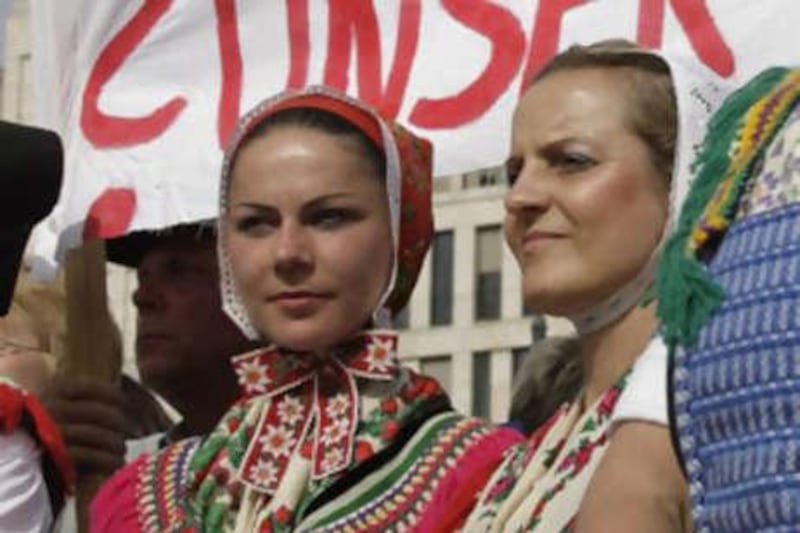BERLIN // Persecuted by the Nazis, forcibly relocated under communism and now under threat from economic migration, Germany's tiny Sorb community is struggling to protect a national identity stretching back over 1,000 years.
The Sorbs, a Slavic people who migrated from what is now Poland and the Czech Republic in the seventh century, are one of Europe's oldest minorities. They have their own flag and national anthem, they marry in black, and they stage spectacular Easter processions in their traditional embroidered lace costumes. The Sorbs number just 60,000 and most of them they live in the region of Lusatia south-east of Berlin, an area famous in Germany for its marshlands and for pumpkin and gherkin cultivation. Many of them are farmers.
The German constitution has enshrined their right as an indigenous community and protects their language, which has similarities with Czech and Polish. Public funding helps maintain Sorb schools, museums and cultural institutions such as theatres. Traffic signs in Lusatia are still written in both German and Sorb and there are communities where it is still normal to order one's bread in Sorb in the village bakery.
But only about 20,000 people still speak Sorb and community leaders say the group's survival is under threat from an expansion of open-cast brown coal mining, cuts in public funding and a gradual dilution of the Sorb population arising from Germans moving into the area and Sorbs moving away to find jobs. "We're under threat not because the government is making life hard for us but because of the way society is developing, which isn't favourable for a minority like us," said Jan Nuk, chairman of the Domowina Sorb society.
About 500 Sorbs demonstrated in Berlin in May against cuts in public funding and the community is stepping up its campaign in the coming months with another demonstration and a petition against the planned bulldozing of further villages to make way for mining. Open-cast mining for brown coal - a cheap but highly polluting source of power - has forced 30,000 people and 136 Lusatian villages to move since 1924.
Much of the upheaval happened during and shortly after East German Communist rule, but it is still going on. The energy group Vattenfall has recently submitted plans to extend its open-cast mining in five areas, which would mean bulldozing another eight villages and relocating 3,700 people. "The situation is dramatic. There's a real danger that no Sorb will be spoken anymore in the Lower Lusatia region in 20 years if this goes on," said Rene Schuster, a Sorb environmental campaigner.
Mr Schuster's group this month launched a petition against Vattenfall's expansion of open-cast mining. Regardless of how many people sign it, the petition will not be binding, but would lead to greater political debate, Mr Schuster said. Many of the Sorbs who have lost their homes have moved away from the region and given up their Sorb identity. The community is little known outside eastern Germany and many west Germans have never heard of the Sorbs.
"We can't build walls around ourselves, we can only try to appeal to our people to stick together to preserve our identity and to maintain an education system that gives our children the chance to learn about our history and learn our language," said Mr Nuk. He said Sorbs had been cowed by a history of oppression. The Nazis closed Sorb schools and newspapers and banned the language in a drive to stamp a single national identity on the German people.
"Some Sorbs were killed in concentration camps. The Nazis forbade everything that was Sorb and if they had gone on the Sorbs would either have been completely wiped out or totally dispersed," said Mr Nuk. "Then after World War Two there was a sense of national awakening among the Sorbs but that was diluted over the decades due to brown coal and industrialisation. "There's no sense of nationhood like you see in Kosovo and elsewhere. Those regions wage wars to get their way. All we want is for our cultural identity to be respected, but some Sorbs regard even that as an excessively bold demand."
In the turmoil that followed both world wars, some Sorbs lobbied to become an autonomous region, but the victorious powers ignored their requests. Then came communism. Farms were collectivised and homes expropriated as the authorities turned vast swathes of the Sorbs' homeland into gaping brown coal mines. However, the East German regime did support the minority by helping it to set up theatres, libraries and other institutions, in return for complete loyalty to the state.
Mr Nuk said the Sorbs plan to stage another demonstration in Berlin soon against cuts in public funding for the community to ?15.6 million (Dh84.7m) from ?16.2m. The Sorbs acknowledge that they are not numerous enough to have much political influence. But Mr Nuk said he was encouraged by the fact that the new prime minister of the state of Saxony, one of two states straddled by the Sorbs' home region of Lusatia, is himself a Sorb.
Stanislaw Tillich, a member of the Christian Democrats, led by Angela Merkel, the chancellor, was elected as premier of Saxony in May. "It strengthens our sense of self," said Mr Nuk. "In our history we never had people to look up to, no kings and no aristocracy, we were largely made up of simple farmers and not especially rich ones. "Tillich is in a difficult position, if he focuses too much on Sorb issues and stresses his Sorb ancestry too much then it will backfire on him because people will accuse him of being too one-sided. But I have a lot of respect for the fact that he mentioned his Sorb ancestry in his inaugural speech. He could have kept quiet about it and we were very gratified that he didn't."
@Email:dcrossland@thenational.ae






